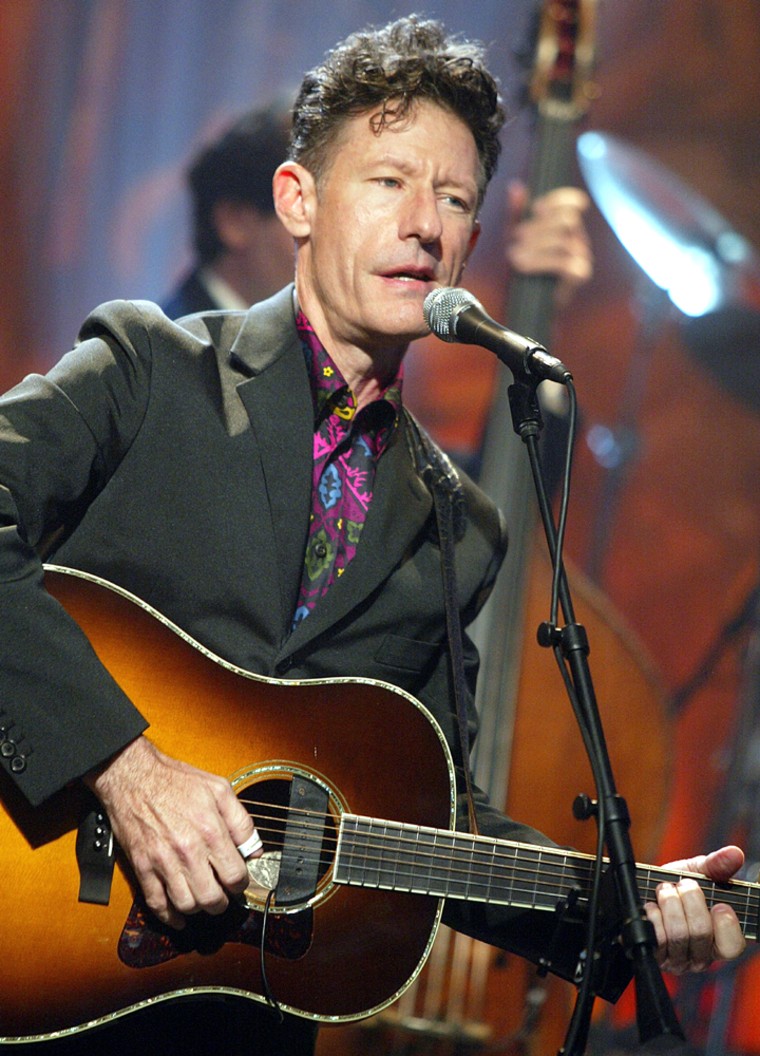The vitality of what has come to be called “country music” is proved by the unruly, contradictory musical and cultural potpourri that it enfolds, and nowhere is this strange stew better on display than the nominations for the major country awards at Sunday’s Grammys.
Though about all they have in common is liberal use of the word “ain’t,” septuagenarian Willie Nelson’s tireless treks across the American musical landscape, the musings of eccentric Texas singer-songwriter Lyle Lovett, Shania Twain’s countrified electro-pop, Faith Hill’s R&B-derived pop, and a tribute to traditional country legends the Louvin Brothers are all in the running for country’s best album.
The most notable personality and musical presence among the nominees is 70-year-old Willie Nelson, a six-time Grammy winner who is making remarkably youthful music on a pace that would daunt a performer half his age. The aging Texas hipster — and a small army of friends and legends — has two albums in the best album category, a duet with Ray Price and a live birthday extravaganza.
“Run That By Me One More Time” is a Western-swinging, honky-tonking delight in 4/4 shuffle and ¾ waltz time with Nelson and another grizzled Texan, 77-year-old Price, the “Cherokee Cowboy.” This is the pair’s second outing together, 23 years after their classic first, “San Antonio Rose.” Willie’s reedy, supple tenor treads lightly but echoes deeply on lost and losing love, and Price’s booming baritone, now a bit frayed around the edges, is the perfect counterpoint. Bobby Floores’ fiddle and David Zettner on pedal steel contribute to the timeless but never dated sawdust and teardrops sensibility.
The duo’s voices play tag, blend at key moments, and illuminate traditional classics like Fred Rose’s “Deep Water” and Floyd Tillman’s “This Cold War With You,” but it is the singers’ originals that shine the brightest.
The pair’s “I’ve Just Destroyed the World I’m Living In” boasts a graceful melody, poignant self-examination, and some charming guitar work from Nelson, whose nylon-stringed, jazzy acoustic leads are as identifiable as his voice. Nelson’s “Something to Think About” is similarly ruminative, and Price’s “Soft Rain” is best of all: a sweet, sad drizzle of palpable regret and fiddle with Price touching the dusty heart at the western end of “country and western.”
Nelson, who has shared the stage with everyone and the horses they rode in on, trots out a staggering array of musical friends on his 70th birthday celebration record, “Live and Kickin’,” a fascinating testament to Nelson’s place in American culture, but ultimately too much of an “event” to hang together musically.
Nelson's charms
One of Willie’s greatest charms has always been his laconic looseness, the seeming casualness with which he conveys a song, but here he slips perilously close to indifference, as if showing up alone were enough this time. For most 70-year-olds simply being there would have been enough, but we have come to expect so much more from this particular one.
Recorded live at New York City’s Beacon Theater last April, Nelson and a crack band led by the great drummer Kenny Aronoff, start off strong with the rollicking “I Didn’t Come Here (And I Ain’t Leaving),” but even here he hurries or talk-sings his way through lines in a way that lets you know that this is a revel rather than a musical document.
Eric Clapton joins in next for a bluesy rendition of Nelson’s self-descriptive standard “Night Life,” and while Slowhand’s stinging electric guitar work takes the song places it has never before gone, his vocals are ragged and thin and Nelson’s are desultory at best.
Perhaps it was just an off-night for Willie’s next guest Shania Twain, or perhaps her skittish, wavering performance on “Blues Eyes Crying In the Rain” reveals just how much help her producer-husband Mutt Lange provides in the studio. Nonetheless, despite Nelson’s best efforts on harmony vocals and his signature guitar picking, one of his most iconic songs (originally on his breakthrough “Red Headed Stranger” album), sadly, does not fare well at all.
Things pick up greatly with a jolt both musical and conceptual: a live version of Nelson and Toby Keith’s No. 1 smash “Beer For My Horses.” On the musical front, the band finally has something to sink its teeth into, which it does with relieved vigor, and Keith’s hale baritone is a great foil for Nelson on this anthem that both celebrates and pokes good-natured fun at core country symbolism. You have got to love a song with a chorus of:
“We raise up our glasses against evil forces,
Singin’, whiskey for my men,
Beer for my horses”
Besides being the centerpiece of this set, the tune is also up for the Best Country Song award, an award songwriters Keith and Scotty Emerick are likely to win against Twain’s “Forever and For Always,” Brad Paisley’s “Celebrity,” Alan Jackson and Jimmy Buffett’s “It’s Five O’ Clock Somewhere,” and Pat Green’s “Wave On Wave.”
Not only is “Horses” an instant classic musically, but it also brings together country’s absolute political bookends: Keith, the Dixie Chick baiting pro-war patriot, and the iconoclastic, pot-smoking lefty Nelson, whose quixotic endorsement of Dennis Kucinich for president and release of the anti-war, anti-Bush song “Whatever Happened to Peace On Earth?” puts him squarely at odds politically and culturally with both Keith and the mainstream country music audience. If Keith can get this cozy with Nelson — and why shouldn’t he? — one wonders why he hates the Dixie Chicks so much.
There are nice moments the rest of the way, even if it ultimately doesn’t all add up: Diana Krall and Elvis Costello on Nelson’s most famous composition, “Crazy,” a preposterously great rasta version of “To All the Girls I’ve Loved Before” with Wyclef Jean, and the sublime Norah Jones on “Wurlizter Prize.” The record is good but it could have been much more.
Lyle returns
Lyle Lovett, who has won four Grammys, is in many ways a younger Willie Nelson: a unique Texas singer/songwriter who combines country, folk, Western swing, blues, and Tin Pan Alley popular music into a seamless, personal whole. His latest, “My Baby Don’t Tolerate,” is a very good, but not great return after an eight-year break from recording his own material.

“Cute As a Bug” is Lovett at his best: a quirky tale of an encounter with a woman in a Volkswagen who is:
“Cute as a bug,
Short as a minute,
“She’s a pretty little package with everything in it.”
Great tune, catchy beat, skewed outlook — all we could ask from the ex Mr. Julia Roberts. The title track is a fine simmering blues number, “The Truck Song” an existential country shuffle in the form of a love song to his truck Old Black, “In My Own Mind” is Lovett’s poignant tribute to the deeply introspective life, and “You Were Always There” is a haunting jazzy ballad about a man who likely will never escape the shadow of abandonment. Nothing much else on the album is up to Lovett’s own high standards, however.
Shania and MuttWhat can one say about five-time Grammy winning country-pop exemplar Shania Twain? In the obsessive hands of her producer, husband and co-songwriter Mutt Lange — who had previously molded the likes of AC/DC, Bryan Adams, the Cars, Def Leppard, Foreigner and Billy Ocean into multi-platinum shape — Twain has become more a symbol than performer, as her carefully-crafted recordings are no less processed than Britney Spears’, or any dance-pop diva’s.
Not being much of a “purist” when it comes to recordings — I don’t much care if it isn’t “authentic” as long as it sounds good — I will not dwell on the absurdity of an electronics-crazed Englishman and a Canadian glamour girl making “country” music, but the question remains, does this pop float? Not really.

The title track, "Up!" is catchy and buoyant in all the right ways, and “I’m Gonna Getcha Good!” is undeniable countrified electro-pop perfection, but that leaves 17 more songs (not even taking into account that all 19 songs are redone without the country trappings on a second disc), including the Grammy-nominated treacly ballad “Forever and For Always,” that just kind of sit there. “She’s Not Just A Pretty Face” is formulaic faux-feminism, “Juanita” is limp Latinesque, and that’s enough of that.
The equally comely Faith Hill’s “Cry” also treads far from the beaten path of traditional country, but in the somewhat daring direction of R&B. The title track is a big, breathy soul ballad that shows off Hill’s impressive lungs, but also veers uncomfortably close to bombast. Hill, who has won four Grammys, displays a surprising hard-edged funkiness on “Free,” which has absolutely nothing country about it, but if it doesn’t bother the country faithful it sure doesn’t bother me.
“One” and “If You’re Gonna Fly Away” find smoky R&B grooves that would fit perfectly well on a Beyonce album, “Beautiful” has a Latin-influenced subtlety that Twain missed in a similar attempt, “Back to You” is an effective rock-oriented power ballad. Though a bit heavy in the ballad department for my taste, this is a very good album that is country in name only, and as such, I think it’s unlikely to take the country album award, but stranger things have happened: Jethro Tull once won the metal Grammy.
The remaining candidate, “Livin’, Lovin’ Losin’: Songs of the Louvin Brothers,” is an exemplary traditional country, bluegrass and gospel album in tribute to one of the purist country duos ever to sing high and lonesome. The brothers, Charlie and Ira, recorded in the '50s and early '60s before Ira died at only 41 in 1965 — their reputation has been growing ever since.
An array of all-star duos take on the Louvin’s songbook, including Joe Nichols and Rhonda Vincent’s “Cash On the Barrelhead,” Emmylou Harris and Rodney Crowell’s gorgeously sad “My Baby’s Gone,” James Taylor and Alison Krauss’s “How’s the World Treating You,” and Vince Gill and Terri Clark’s up-tempo weeper “I Can’t Keep You In Love With Me” — great stuff all. The collection closes with the sweet-pickin’ bluegrass of Marty Stuart and Del McCoury on “Let Us Travel, Travel On,” and the blessed country gospel of Pam Tillis, Johnny Cash and the Jordanaires doing “Keep Your Eyes On Jesus.”
The Louvins have the “O Brother, Where Art Thou” factor going in their behalf, the Willie live album has spectacle in its corner — my heart’s with the Louvins, but my head says Willie takes the country album Grammy. That the catchall category of country — with roots both bedrock-deep and surface-shallow in rural, urban and suburban America — somehow hangs together is a tribute to the power and flexibility of the music itself, and perhaps also to the melting pot ideal of the nation.
Eric Olsen is the editor of and a regular contributor to MSNBC.com.